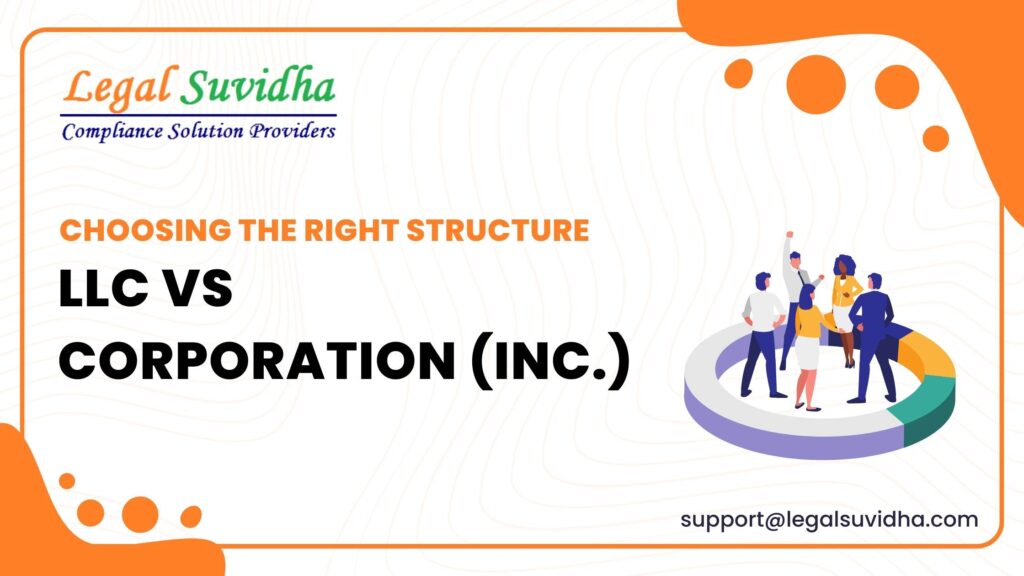Selecting the optimal legal form is a critical decision when launching your U.S. venture. Both LLCs and Corporations offer liability protection, but they differ in governance, taxation, ownership transfer, and compliance requirements. This guide breaks down these differences to help you decide which structure aligns best with your growth plans.
1. Legal Structure & Ownership
Why It Matters: Your entity’s structure determines control, flexibility, and transferability.
Key Differences:
-
- LLC: Owned by members (individuals, companies, or foreign entities); can be member‑managed or manager‑managed; membership transfers typically require approval from existing members.
- Corporation: Owned by shareholders holding freely transferable shares; governed by a board of directors and officers; share transfers generally do not require approval.
2. Liability Protection
Why It Matters: Limits personal risk for business obligations.
Key Points:
-
- LLC: Members are protected from business debts unless they personally guarantee obligations or engage in fraud.
- Corporation: Shareholders, directors, and officers enjoy limited liability but must adhere strictly to fiduciary duties to avoid personal claims.
3. Taxation & Reporting
Why It Matters: Tax treatment affects net income and administrative effort.
Key Points:
-
- LLC: Default pass‑through taxation—profits and losses flow to members’ personal returns; subject to self‑employment taxes; option to elect S‑Corp or C‑Corp status for potential tax benefits.
- Corporation:
- C‑Corp: Pays corporate income tax; dividends face double taxation at the shareholder level.
- S‑Corp: Pass‑through taxation avoids double taxation; limited to U.S. citizens/residents and up to 100 shareholders.
4. Compliance & Formalities
Why It Matters: Ongoing formalities impact time and operational costs.
Key Points:
-
- LLC: Minimal paperwork; no mandatory annual meetings or bylaws (Operating Agreement recommended).
- Corporation: Must hold annual shareholder meetings, maintain bylaws, appoint a board of directors, and file annual reports.
5. Fundraising & Investors
Why It Matters: Entity choice affects access to capital and investor appeal.
Key Points:
-
- LLC: Cannot issue stock; admitting new members involves more complex agreements; less attractive to venture capitalists.
- Corporation: Can issue multiple classes of stock; easier to attract venture capital; potential for an initial public offering (IPO).
6. Ownership Transfer
Why It Matters: Liquidity and ease of transfer influence exit strategies.
Key Points:
-
- LLC: Transfer of membership interest typically requires approval of other members; offers less liquidity.
- Corporation: Shares can be freely transferred, sold, or gifted without shareholder approval; supports flexible exit strategies.
7. Which Structure Suits Your Business?
Why It Matters: Align your choice with your operational needs and growth objectives.
Consider an LLC if:
-
- You seek management flexibility and fewer formalities.
- You prefer pass‑through taxation without double taxation.
- You don’t plan to raise venture capital or go public.
Consider a Corporation if:
-
- You aim to attract investors or issue various classes of stock.
- You plan significant expansion, including an IPO.
- You’re comfortable with additional governance and compliance requirements.
Take Action Today
- Book a Free Credibility Consultation
- Call us at +91 81306 45164 to get expert guidance on choosing your U.S. entity structure.
Final Thought:
Choosing the right entity structure sets the foundation for your company’s future. Whether you prefer the flexibility of an LLC or the structured governance of a Corporation, LegalSuvidha is here to guide you through every step—ensuring compliance, optimizing tax benefits, and supporting your growth ambitions.










